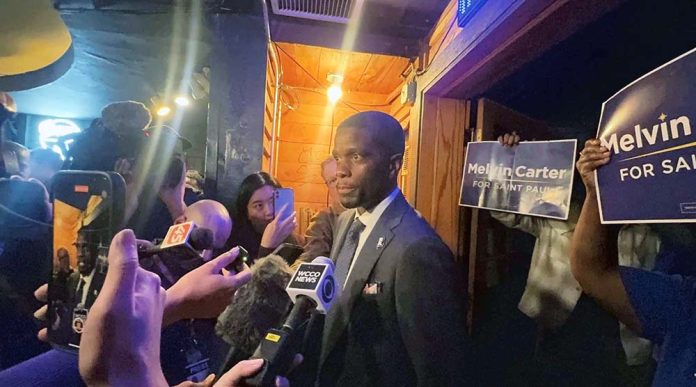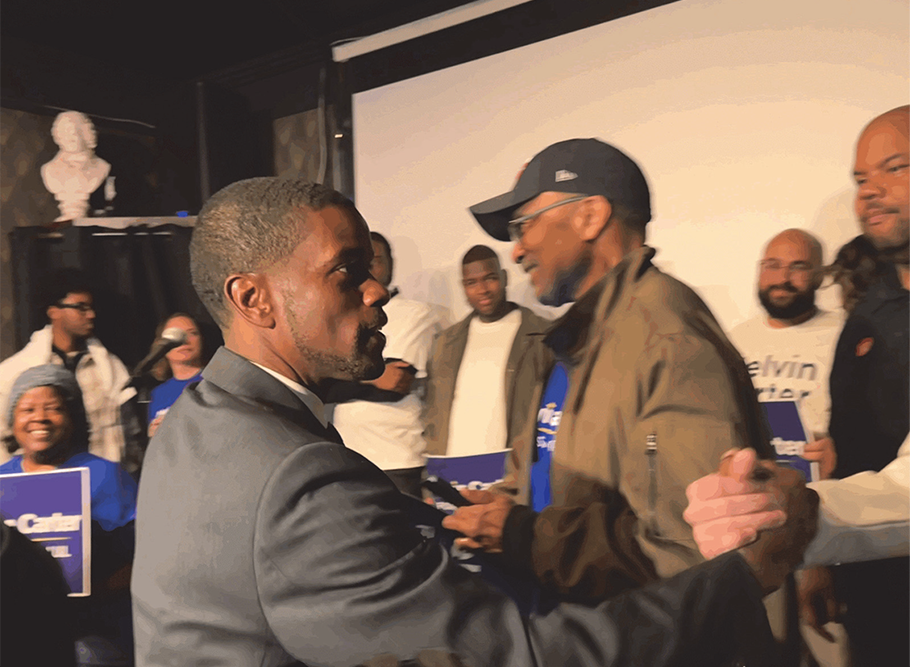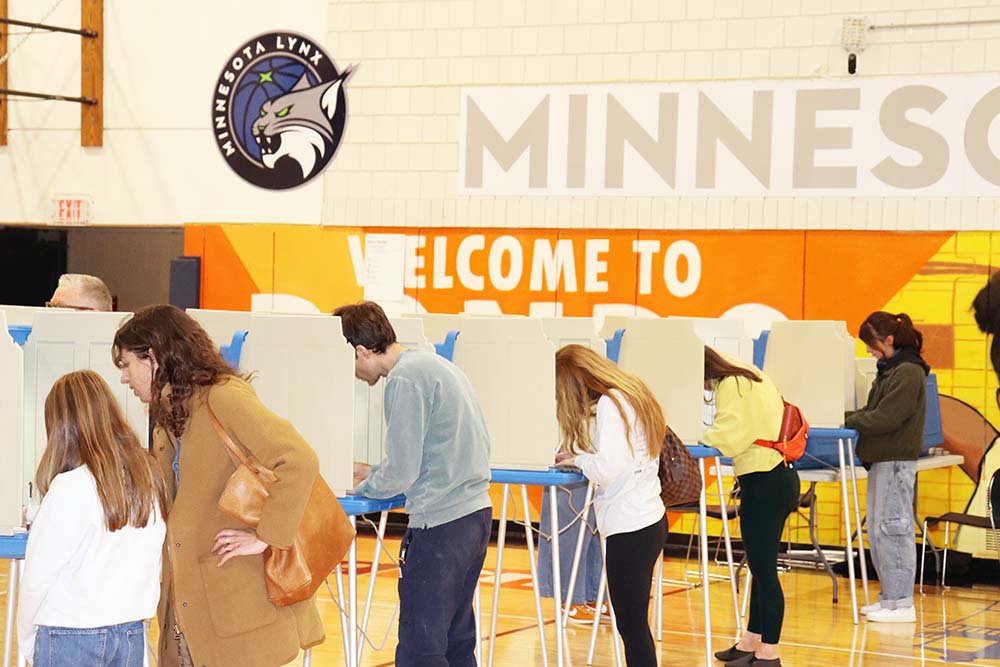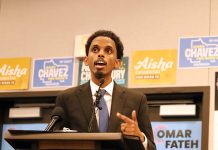

When supporters of St. Paul Mayor Melvin Carter III gathered Tuesday night at The Black Hart, a bar in the Midway neighborhood, many of them didn’t seem too worried that he would not be re-elected.
They watched election results display across the TV screens, many glancing at their cell phone repeatedly, looking confirmation that Carter would be re-elected to lead Minnesota’s capital city for a third term. Among the supporters was Monica, a Merriam Park resident who attended the watch party with her daughter and only gave her first name.
“We came out tonight hoping to see Mayor Carter win,” she said. “My daughter and I are big supporters. We met him a while back when a space in our neighborhood was reopening, and he took the time to really talk and connect. It made me feel like he sees the community.”
The atmosphere in the bar was initially upbeat. People hugged, laughed and greeted one another warmly. Music played in the background. Campaign volunteers stood with longtime residents, families, and organizers who have followed Carter’s work since he became the city’s first Black Mayor in 2017.
Michael Garofalo, a Carter campaign organizer who resides on West 7th, said that the mayor represented something that was personally important to him.
“As a young person and a renter, I think a lot of people like me are looking for someone to believe in,” Garofalo said. “Not just a policy list or a party label, a person. Mayor Carter has been a great leader, he listens and shows up. That matters.”
Another supporter, Haley Taylor Schilitz, an attorney working in public safety, highlighted Carter’s approach to safety issues.

“I really support what he’s trying to do,” she said. “He addressed public safety from all angles, the opioid crisis, gun restriction advocacy and making schools safer and the streets safer, and he’s open to discussion, he’s not just a campaign figure. He’s a resident.”
The mood began to gradually shift into a quiet focus as numbers came in. Early returns showed Carter leading with just over 40% of first-choice votes, while his closest opponent followed behind with about 38%.
Under St. Paul’s ranked-choice voting system, a candidate must receive more than 50% to win outright. With no opponent reaching that threshold, the race moves into additional rounds, where second and third choice rankings determine the winner.
As the night continued and people slowly left, it became clear that Carter’s path to victory was slowly narrowing. He conceded.
“We’ve seen each other through some of the most challenging crises that this city, this state, this country, this world, have ever been through.” he said during his concession speech. “I am an old track guy, so I’ve got to close with a track analogy. At some point, it becomes time to pass the baton. And the question is, are you passing that baton on to stronger and in better position than you received it? The answer is, yes.”
Carter said the progress the city had made in the last eight years had never been because of him, but It has always been because of you,” he said. “It’s always been because of us. It has always been because of just the incredible spirit, the strength, the innovation, the creativity that this city possesses in droves in every single corner. None of that changes tonight.”
Carter’s successor, Minnesota state Rep. Kaohly Her, made history by becoming the first woman and first Hmong American to be elected mayor of St. Paul. But perhaps the reason Carter passed the baton to Her with a smile was personal. She was his policy director before she was elected to represent District 64A in the Minnesota House of Representatives. He urged those who had voted for him to support Her.

“I am going to ask all of you, in just the same way that you helped me,” he said. “In just the same way you supported me, in just the way you stepped in to be a part of this journey that we’ve taken over the past eight years, to do that exact thing for Representative Her as she takes this baton and charges forward on behalf of all of us.”
During his two terms in office, Carter championed high-profile policies that gained national attention. His initiative, Peoples Prosperity Guaranteed Income Pilot Program (PPP), which he launched in 2020, was designed to provide monthly payments to families without restrictions on how they spent the money. The initiative gained national attention and inspired similar pilot programs in cities across the United States.
Carter’s administration also had a community-focused approach. Expanding and investing in violence prevention initiatives, alternative crisis response, and alternative first responder models for mental health and crisis calls.
Housing affordability was another defining issue of Carter’s administration.
In recent years, St. Paul’s housing market has seen a rise in rent costs and limited availability, prompting the administration to pursue multiple strategies to expand accessible housing. His administration launched a downpayment assistance program that offers up to $40,000 to use towards buying a home, closing costs and/or property inspection with additional funds available for first-generation homebuyers and residents. Eligible residents can access up to $110,000 from the city’s Inheritance Fund, which was set up to reduce racial homeownership gaps and build generational wealth.
Carter’s campaign for a third term centered on the same themes that have shaped his mayoral terms – economic mobility, community-based public safety, and expanded access to housing.
He framed his campaign as guiding the city through a moment when St. Paul is still working to determine how best to support families facing rising costs, address safety concerns, and ensure equitable growth benefits in every neighborhood.
His team had intended to enter a third term focused on implementation rather than launching new programs. Carter has frequently pointed to a drop in violent crime, ongoing investments in street repairs and infrastructure.
In addition to the mayoral race, voters were also asked to vote on City Question 1, which asked whether to amend the City Charter to allow St. Paul to issue administrative citations, civil fines for certain ordinance violations, instead of relying solely on criminal penalties. Voters approved the measure by 68.19%.
About Lizzy Nyoike - Mshale Contributing Reporter
Lizzy Nyoike is a Hubbard School of Journalism & Mass Communication student.











